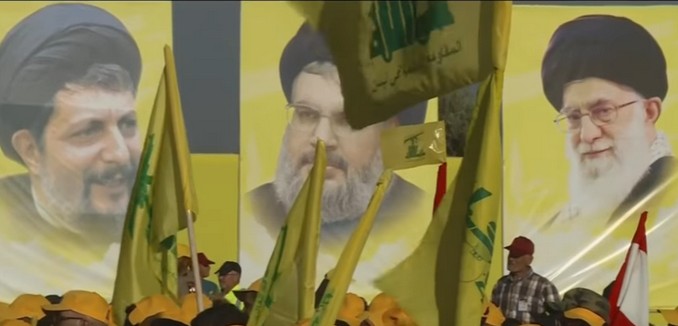Ahead of a vote in the House of Commons Thursday to designate Hezbollah in its entirety as a terrorist organization, two experts have urged Members of Parliament to recognize that there is no distinction between the so-called “political” and “military” wings of the Lebanon-based group. A recent poll showed that Britons favor the designation by a 4 to 1 margin.
Writing in The Spectator, Lord Richard Dannatt, the former Chief of the General Staff of the British Army, argued that “nobody seriously believes that anyone other than Hassan Nasrallah has the final word in its chain of command, be it on politics or terrorism.”
While it may have once been practical to maintain the “diplomatic fiction” of two distinct wings of Hezbollah when Lebanon was “conceivably comprised of Western-oriented elements versus Iran-aligned Hezbollah,” now the Iran-backed terrorist group has effectively captured Lebanon, making the distinction irrelevant.
Using its control of Lebanon, Hezbollah has built up its arsenal “most notably through the acquisition of advanced rockets.” In addition, with Iran’s expanding footprint throughout the Middle East, the Islamic Republic has been emboldened to ship weapons openly to Lebanon.
Hezbollah has also turned much of southern Lebanon “into a permanent military compound, complete with tunnels, munitions holdings, and armed personnel.”
“Hezbollah’s advanced capabilities have fundamentally altered the military and political calculus in the region and forced a capitulation in Beirut,” Dannat wrote. “It is hard to overstate the extent to which Hezbollah has now become Lebanon’s de facto government.”
The way to counter Hezbollah’s threat, which “has become the world’s premier terrorist entity – the only group of its kind capable of starting a major conventional war,” would be to designate “Hezbollah in its entirety as a terrorist group.”
Matthew Levitt, the director of the counterterrorism program at the Washington Institute for Near East Policy, noted in The Hill that Hezbollah’s terrorist wing was banned in the United Kingdom in 2001 and its military wing in 2008, but that “Hezbollah must find this pretty bemusing.”
As Levitt noted, Deputy Secretary-General Naim Qassem, famously boasted that Hezbollah does not “have a military wing and a political one; we don’t have Hezbollah on one hand and the resistance party on the other…Every element of Hezbollah, from commanders to members as well as our various capabilities, are in the service of the resistance, and we have nothing but the resistance as a priority.”
Levitt cited the example of Abdallah Safieddine, who is Hezbollah’s political representative in Tehran. Safieddine also heads Hezbollah’s Business Affairs Component (BAC), which investigators believe was established by notorious terrorist Imad Mughniyeh and is used to fund Hezbollah’s terrorist and military operations.
When the UK discovered that Hezbollah was behind attacks on its troops stationed in Iraq, the United States found evidence that Safieddine was involved in supplying improvised explosive devices (IED) to the anti-coalition forces in Iraq.
Although Hezbollah acknowledges that there is no distinction between its various wings, it prefers to play down the links between its political and military activities. Nasrallah has expressed concerns that if Hezbollah, in its entirety, is designated as a terrorist organization in Europe, it “would dry up the sources of finance, end moral, political and material support” of the organization.
“The only way to ‘dry up’ the financial and material support for Hezbollah that still flows from the UK and elsewhere in Europe,” Levitt concluded, “is to designate the group in its entirety.”
[Photo: PBS NewsHour / YouTube]




